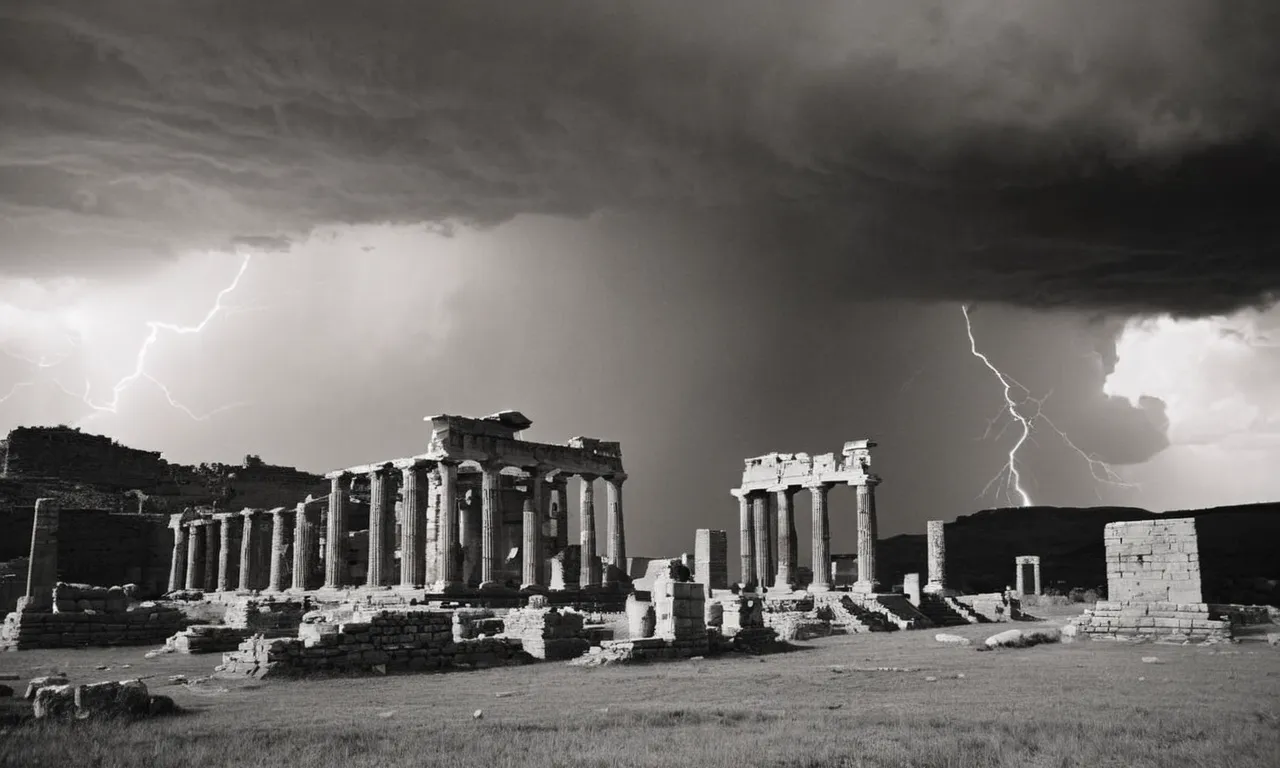Why Does God Seem So Mean In The Old Testament?
The God of the Old Testament often seems angry, vengeful, and even cruel compared to the loving God portrayed in the New Testament. This contrast leaves many readers struggling to reconcile these two images of God.
If you’re short on time, here’s a quick answer: God acts strongly in the Old Testament to establish His authority and righteousness, guide the Israelites, and prepare the way for Jesus’ later message of grace and redemption.
In this comprehensive article, we’ll explore the reasons behind God’s harsh actions in the Old Testament and how they ultimately reveal a God who is both just and loving.
God Was Establishing His Sovereignty
Delivering the Israelites from Oppression
God delivered the Israelites from slavery in Egypt through miraculous plagues and parting the Red Sea (Exodus 7-14). This demonstrated God’s power over the Egyptian gods and His commitment to save His people. Though harsh on the Egyptians, it showed God’s compassion for the oppressed Israelites.
Judging Other Gods and Idols
The Canaanite gods like Baal were associated with horrible practices like child sacrifice. By judging these gods (Numbers 33:52), God was protecting Israel spiritually and physically. While difficult to understand today, in the ancient world defeating a nation and its gods showed your supremacy.
Enforcing Strict Rules to Set Israel Apart
Rules about diet, agriculture, priestly duties, and more distinguished Israel from neighboring peoples. Keeping God’s law demonstrated loyalty to Him (Deuteronomy 10:12-13). Though requirements seem odd today, they prevented Israel from following pagan practices that were cruel and destructive.
God Was Guiding an Immature Nation
The Israelites Had Limited Spiritual Understanding
When God chose the Israelites to be His people, they were like spiritual toddlers. They had been influenced by the idolatrous cultures around them and had little real knowledge of God. So God gave them simple commands and strict rules to teach them right from wrong.
He had to firmly guide them, like a parent teaching a young child not to touch a hot stove.
The Israelites simply didn’t have the spiritual maturity or discernment to understand deep theological truths. God gave them basic rules and commands to steer them in the right direction. Over time, as they matured in their faith, God revealed more of His nature and plans.
Harsh Punishments Deterred Idolatry and Rebellion
Idolatry was rampant among the Canaanite nations surrounding Israel. God knew the magnetic pull it could have on His people. So He warned them that idolatry and rebellion would bring severe punishment – even death. This deterred the Israelites from following the pagan practices of their neighbors.
While these punishments seem overly harsh today, they served an important purpose. They powerfully impressed on the Israelites that God alone was to be worshipped and obeyed. The strict consequences curbed the temptation to stray from Him.
Blessings and Curses Motivated Obedience
God also used blessings and curses to motivate the Israelites to obey Him. He promised prosperity, success, and well-being for faithfulness. But unfaithfulness would bring calamity, disease, and defeat. This system of reward and punishment gave them tangible reasons to follow God’s laws.
Of course, a system based on outer conduct alone has limitations. As the Israelites matured spiritually, God wanted obedience that flowed from an inner love for Him. Through the prophets, He promised a new covenant written on their hearts (Jeremiah 31:33).
However, the blessing and curses effectively guided the fledgling nation.
God’s Justice Requires Judgment of Sin
God’s Nature Includes Righteous Anger
The God of the Bible is a God of perfect love and perfect justice. His very nature demands that He judge and punish sin. As the sovereign Creator of the universe, God cannot simply overlook sin – He must deal with it righteously.
God’s anger towards sin comes not from a flaw in His character, but from His holiness and justice. Just as we get angry when we see horrific injustice in the world, so too God is angered by the injustice, cruelty, and unrighteousness He sees.
His anger shows He cares deeply about right and wrong.
An example of God’s righteous anger can be seen in Exodus 32, when God was angered by the idolatry of the golden calf. God’s anger led to judgment, displaying His justice.
Though harsh at times, God’s judgment teaches vital lessons about His intolerance of sin.
Judgment Demonstrates the Seriousness of Sin
Judgment may seem severe, but it flows from God’s holiness and demonstrates the devastating consequences of sin. Every time God struck down sin in the Old Testament, people were reminded that sin corrupts and destroys.
God’s harsh punishments showed sin’s false promises and shook people from complacency.
One example was the judgment of Korah’s rebellion in Numbers 16. When the earth opened up and swallowed the rebels whole, the graphic nature of the judgment displayed the seriousness of sin before God.
The Lord was teaching important object lessons about the poisonous fruit of wickedness.
Though tragic at times, the Old Testament judgments steer us away from sin’s path by revealing its darkness. They serve as warnings that our holy, righteous God will not let evil go unpunished forever.
Judgment Often Prefigures Christ’s Sacrifice
Many acts of Old Testament judgment foreshadowed the ultimate judgment that was to come – when Christ would bear God’s full wrath against sin. The animal sacrifices, Passover lamb, scapegoat, and other substitutions all prefigured the once-for-all sacrifice of Christ to atone for sin.
The suffering Servant passages in Isaiah also depicted Christ as receiving God’s judgment on behalf of sinners. Isaiah 53:5 says “He was wounded for our transgressions; He was crushed for our iniquities.”
God’s righteous anger fell upon Christ so we could be spared.
All the Old Testament judgments whisper that a reckoning is coming. That Day finally arrived with Christ, who fully absorbed God’s wrath and satisfied His justice through the cross. God’s mercy triumphs, yet His holiness stands.
Perfect love and justice meet at the cross.
Looking Ahead to Grace and Redemption
The Old Testament Lays the Foundation
The Old Testament provides the groundwork for understanding God’s plan of salvation and redemption through Jesus Christ. Many of the laws, stories, prophecies and themes establish God’s holiness and righteousness, human sinfulness and need for atonement, and foreshadow the coming of the Messiah.
For example, the sacrificial system points ahead to Christ’s sacrifice on the cross that takes away sin once and for all (Hebrews 10:1-18). The Passover lamb and the Ark’s mercy seat reflect the concept of atonement and redemption (Exodus 12; 25:17-22).
The suffering servant passage in Isaiah 53 astonishingly describes Jesus’ suffering and death for sinners hundreds of years in advance.
Stories Foreshadow Christ’s Redemption
Many Old Testament stories foreshadow or reflect Jesus’ redemption in uncanny ways. Abraham’s near sacrifice of Isaac points ahead to God sacrificing His own Son (Genesis 22). The bronze snake that Moses put on a pole to save dying Israelites symbolizes Christ on the cross saving people from sin (Numbers 21:4-9; John 3:14-15).
Joseph’s rejection and suffering leading to saving his family hints at Jesus’ death leading to salvation. Rahab the prostitute putting a scarlet cord out her window recalls the blood of Christ delivering sinners (Joshua 2).
David himself was a great sinner, yet was chosen and empowered by God, looking forward to Jesus associating with sinners during His ministry.
Promises of A New Covenant
The Old Testament looks expectantly forward to a “new covenant” that God would establish with His people, accompanied by an outpouring of the Holy Spirit enabling obedience from the heart. Key texts like Jeremiah 31:31-34, Ezekiel 36:24-28 and Joel 2:28-29 are fulfilled by Jesus inaugurating the new covenant in His blood at the Last Supper (Luke 22:20).
The new covenant promises inward transformation that empowers God’s people to truly know Him, in contrast to the old covenant’s external law. The Old Testament anticipates this grace and empowerment that would come in the Messiah and the new covenant He would inaugurate.
The stage is set for the climax of redemption through Christ’s incarnation, death for sins, and resurrection by hundreds of messianic prophecies and foreshadowings through intriguing stories and God’s promises.
Conclusion
While God’s harsh judgment and strict rules in the Old Testament can be troubling, looking closer reveals a God who is establishing His righteous rule and preparing His people for redemption. By better understanding God’s motives and the historical context, we see a consistent, loving God who guides humanity firmly yet mercifully across both Old and New Testaments.








